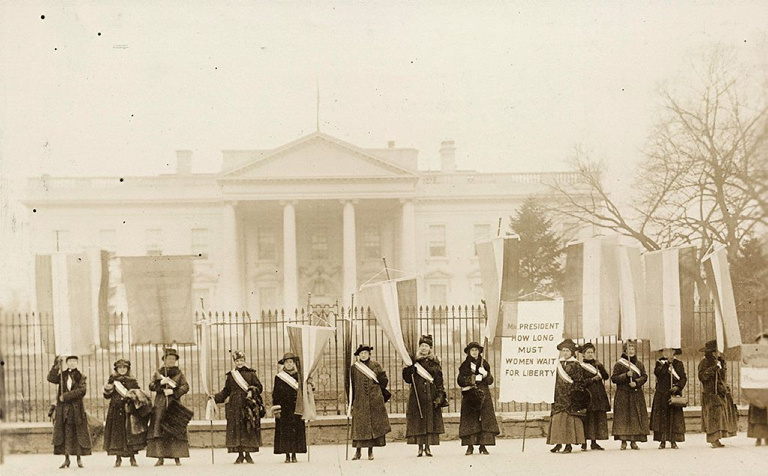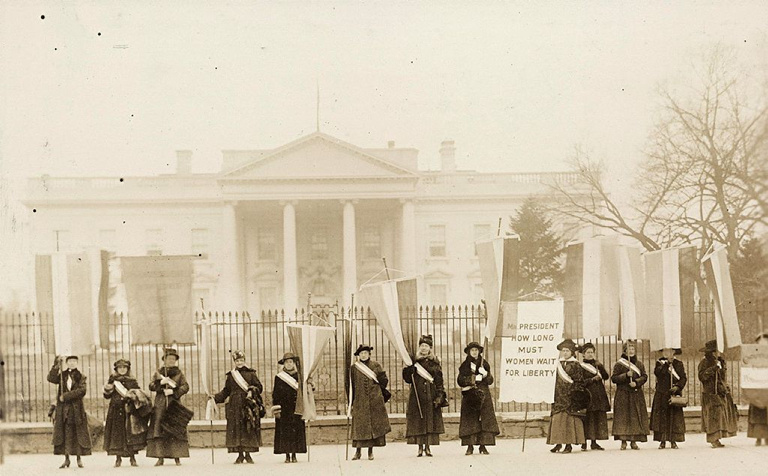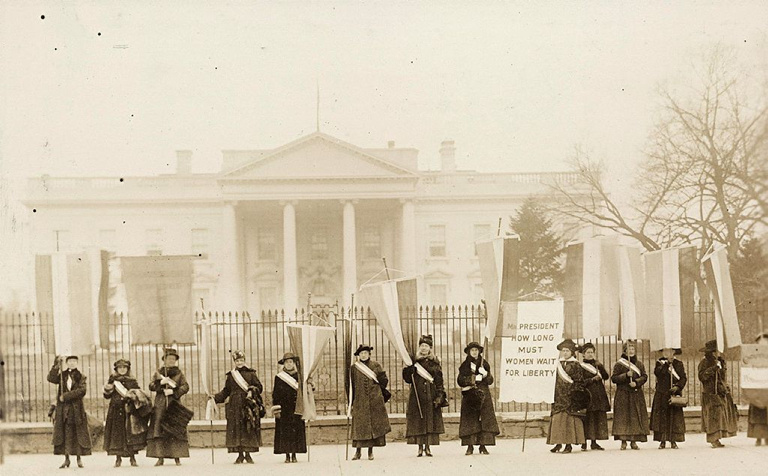Women demonstrating for their right to cast a ballot were the very first group to form a picket line in front of the White House — and they stayed there for over two years.
At issue was the democracy called America. They believed that with a democracy comes a vote for every citizen, and in 1917 women could not vote. These were the suffragists, and they were standing up for half of the population of the United States — the women.
The women persisted, taking turns on the picket line, leaving their homes to travel to Washington, D.C., and maintain a peaceful demonstration for women’s suffrage. They were repeatedly arrested (for obstructing the sidewalk), jailed and force-fed during hunger strikes. This picket line was the final stage of a campaign for women’s rights that had been running for decades.
On the night of Nov. 14, 1917 — 100 years ago Tuesday — the protesters were beaten and jailed for insisting on their rights. Following press coverage of the beatings and the ensuing public outrage, they were released.
The years of protest and pressure finally paid off in 1920, when the women of America were granted the right to vote by the 19th Amendment. It was touch and go until the final ratifications by the states; there was a struggle in every state. But because of the persistence of those women, because of their determination to have the rights they thought they should have, our democracy became more complete and today American women can vote.
The right to vote is the only right explicitly granted to women in the U.S. Constitution. Ours is one of very few developed nations not to have equal rights for women spelled out in its constitution.
Our Constitution is also one of the oldest constitutions still in force, written in the 18th century when it was written by and intended for white men. That is why many of the laws designed to protect women from discrimination tend to fail. Laws pertaining to pay equity fail. Laws prohibiting sex discrimination in the workplace fail. Laws addressing violence against women fail.
Women have the right to vote, but in the United States they do not have full equality under the law. Without clear constitutional backing, protective laws aren’t enforced and are at risk of being repealed. Women won’t have full equality under the law until more voting Americans see that equal rights for women will not harm us — that equality will help women, families, children and men. We all benefit when our working women are paid fairly, when girls grow up being respected as much as boys are and when there is a strong defense against sex being used as a weapon.
The U.S. Constitution clearly protects Americans from discrimination on the basis of race, color, religion and national origin. It does not similarly protect Americans from sex discrimination.
The Equal Rights Amendment to the Constitution says what needs to be said, and it says it simply: “Equality of rights under the law shall not be abridged by the United States or by any state on account of sex.”
The ERA was first proposed in 1923, by those same women picketing the White House. They knew that their work was not complete after the right to vote was achieved. Ensuring equal rights for women was the next step. Those rights are as fundamental to our democracy as the right to vote.
The ERA came close to becoming law in the 1970s when it was overwhelmingly approved by Congress and sent to the states for ratification. It failed to be ratified by three of the required 38 states. At that time, 35 years ago, the open opposition to the ERA focused on marriage and divorce law, same-sex marriage, women in combat, abortion and shared bathrooms.
In the intervening years, most of these issues have been resolved in the courts, where they belong. More concealed opposition came from some influential business lobbying. For example, until the Affordable Care Act, women had been paying higher insurance premiums without cause. Women continue to be paid lower wages than men for equal work. Those inequalities remain. Is the outdated fear of the social change that has already happened worth denying women the respect of being included in the Constitution?
Equal rights for women have been held hostage by the past. Efforts are underway in most states across the nation to bring this basic issue of American democracy to the attention of the public once again. The ERA is not dead, but it is still unratified This is a national disgrace. We do not have those rights, and we need them.
Nancy Murdock is co-founder of Equal Rights Maine, advocating for an Equal Rights Amendment to the U.S. Constitution, and
a resident of Brooklin.
Send questions/comments to the editors.





Comments are no longer available on this story